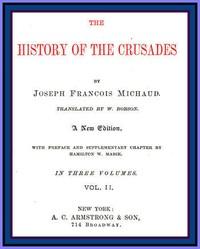Read this ebook for free! No credit card needed, absolutely nothing to pay.
Words: 201717 in 30 pages
This is an ebook sharing website. You can read the uploaded ebooks for free here. No credit cards needed, nothing to pay. If you want to own a digital copy of the ebook, or want to read offline with your favorite ebook-reader, then you can choose to buy and download the ebook.


: The History of the Crusades (vol. 2 of 3) by Michaud J Fr Joseph Fr Robson William Translator - Crusades
FOURTH CRUSADE.
FIFTH CRUSADE.
SEVENTH CRUSADE.
HISTORY
OF
THE CRUSADES.
FOURTH CRUSADE.
A.D. 1195-1198.
WHEN we cast a retrospective glance over the periods we have described, we congratulate ourselves upon not having lived in those times of war and trouble; but when we look around us, and reflect upon the age of which we form a part, we fear we have little reason to boast over the epochs commonly termed barbarous. During twenty-five years a revolution, born of opinions unknown to past ages, has pervaded cities, agitated nations, and shaken thrones. This revolution has for auxiliaries war and victory; it strengthens itself with all the obstacles that are opposed to it; it is for ever born again from itself, and when we believe we can perceive the end of its ravages, it re-appears more terrible and menacing than ever. At the moment in which I resume the account of the Crusades, the spirit of sedition and revolt, the fanaticism of modern doctrines, which seemed to slumber, all at once awake, and again threaten the world with universal disorder; nations which tremble for their liberty and their laws, are aroused, and spring up in arms; a coalition of all kings and of all nations, a general crusade is formed not to defend the tomb of Christ, but to preserve that which Europe possesses of its ancient civilization. It is amidst the rumours of a new revolution, of a formidable war, that I am about to describe the revolutions and wars that disturbed the East and the West in the middle ages. May I, whilst deploring the calamities of my country, profit by the events of which I am a witness, and by the frightful spectacle which is before my eyes, to paint with greater truth the passions and the troubles of a remote age, and revive in the hearts of my contemporaries a love of concord and peace.
The death of Saladin was followed by that which almost always is to be observed in the dynasties of the East,--a reign of agitation and trouble succeeding a reign of strength and absolute power. In these dynasties, which have no other support but victory, and the all-powerful will of a single man, as long as the sovereign, surrounded by his soldiers, commands, he is tremblingly obeyed; but as soon as he has closed his eyes, his people precipitate themselves towards license with the same ardour that they had yielded to servitude; and passions, long restrained by the presence of the despot, only blaze forth with the greater violence when there remains nothing of him but a vain remembrance.
Saladin gave no directions respecting the order of succession, and by this want of foresight prepared the ruin of his empire. One of his sons, Alaziz, who commanded in Egypt, caused himself to be proclaimed sultan of Cairo; another took possession of the sovereignty of Aleppo, and a third of the principality of Amath. Malek-Adel, the brother of Saladin, assumed the throne of Mesopotamia, and the countries in the neighbourhood of the Euphrates. The principal emirs, and all the princes of the race of the Ayoubites, made themselves masters of the cities and provinces of which they held the command.
Afdhal, eldest son of Saladin, was proclaimed sultan of Damascus. Master of Syria, and of the capital of a vast empire, sovereign of Jerusalem and Palestine, he appeared to have preserved something of the power of his father; but all fell into disorder and confusion. The emirs, the old companions of the victories of Saladin, endured with reluctance the authority of the young sultan. Several refused to take the oath of obedience, drawn up by the cadis of Damascus; others consented to take it, but on condition that their fiefs should be secured to them, or that new ones should be bestowed upon them. Far from labouring to reduce the power of this haughty soldiery, Afdhal neglected the duties of his throne for the pleasures of debauchery, to which he gave himself up entirely, abandoning the welfare of his empire to a vizier, who rendered him odious to the Mussulmans. The army demanded the dismissal of the vizier, whom they accused of having usurped the authority of the prince: the vizier, on his part, advised his master to banish the seditious emirs. The weak sultan, who only saw with the eyes of his minister, annoyed by the presence and complaints of a discontented army, dismissed from his service a great number of soldiers and emirs, who went among all the neighbouring princes, complaining of his ingratitude, and accusing him of forgetting, in the bosom of idleness and effeminacy, the holy laws of the prophet and the glory of Saladin.
Free books android app tbrJar TBR JAR Read Free books online gutenberg
More posts by @FreeBooks

: Tampereen kaupunki Muisto Sen Satavuotis-Juhlastansa Lokakuun 1. päivänä 1879 by Bl Field Karl Otto Johan Reinholm Henrik August - Tampere (Finland) History


: A Middy's Recollections 1853-1860 by Montagu Victor Alexander - Great Britain. Royal Navy Biography; Montagu Victor Alexander 1841-1915





